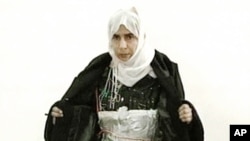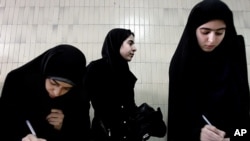More and more women throughout the world are participating in terrorist and extremist groups, and social media is playing a key role in the trend, according to leading experts.
While many experts cited coercion as the primary reason most women join violent extremist groups, other authorities participating in a forum in Washington pointed to more sophisticated and nuanced explanations.
Many women who joined extremist groups were searching for identity and a sense of belonging, said Rabia Chaudry, a fellow at the U.S. Institute of Peace. “They want to show they are as dedicated to the cause as men,” she said Monday at the institute’s Conflict Prevention and Resolution Forum.
Chaudry, whose family originates from Pakistan, added that young women in the United States who belong to families from non-Western countries tend to suffer from identity crises. This makes them vulnerable to alluring social media messages and images from terrorist pitches, even though the messages originate outside America. “They don’t feel anti-American, but they don’t feel American,” she said.
Reaction to Trump
Chaudry offered a profound example of how Western media can alienate young women with cultural connections to non-Western societies, one involving presumptive Republican presidential nominee Donald Trump and her second-grade daughter. “Trump is coming. We have to get out of here,” Chaudry said her daughter told her.
Savvy social media campaigns have been particularly effective in recruiting women to extremist organizations, said Michael Shipler, Asia regional director for the conflict resolution group Search for Common Ground. “Social media has been a real catalyst” for the shift in the way insurgencies are operating.
“Social media was a fundamental enabler” for al-Qaida, Shipler added. And Islamic State has built upon al-Qaida’s success by developing and executing highly successful and personalized “user journey” social media campaigns. They “create entry points for people to begin a journey, ultimately leading to recruitment.”
IS social media campaigns, Shipley said, are typically “short” and “very rapid,” in order to maximize “the power of the desire to cause change.”
“Insurgencies are inherently built on popular support," Shipley added.
While women are increasingly participating in violent acts, their involvement in violent extremist groups is hardly a new phenomenon, said Kathleen Turner, a U.S. Army War College fellow at the institute. She said women have participated in insurgencies and revolutionary groups such as Peru’s Shining Path, the Revolutionary Armed Forces of Columbia (FARC) and, most recently, Boko Haram and IS.
Respect factor
In describing the female members of FARC, Turner said respect appears to be a powerful motivator for recruiting women to fight.
“They were more vicious, they were more ruthless, because they felt they had something to prove,” she said.
State-sanctioned social media and other public awareness campaigns have not been effective in countering violent extremism, according to Shipley. He advises governments to create movements that offer “alternative notions of who we really are.”
The U.S. government must first recognize the role of women in terrorist groups, according to Turner. Not viewing women as a threat is “a concern,” adding that terrorist groups are more willing to use women as combatants and even suicide bombers.
Turner recommended that the United States adopt a multifaceted approach to combat the rise of female terrorist activity, including prevention, training engagement and more study.













